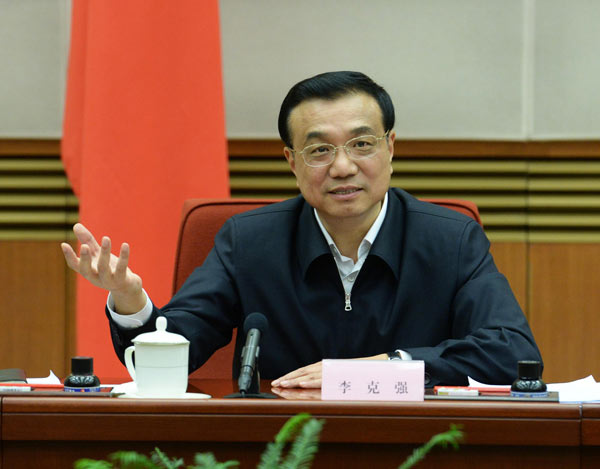 |
|
Chinese Premier Li Keqiang presides over a meeting attended by experts and entrepreneurs to discuss the economic development, in Beijing, capital of China, Oct. 31, 2013. [Photo/Xinhua] |
Li: GDP won't grow as quickly, but it will be more sustainable
Premier Li Keqiang said China will seek a "golden mean" between GDP growth and reform.
Li made the comments at a meeting with economists and corporate leaders in Beijing to solicit their views on economic development.
The premier said China must keep up a reasonable and considerable rate of growth, although it is admittedly unrealistic to expect the near double-digit growth rate to continue.
A certain degree of growth is needed, Li said, "to generate new opportunities for the job market, to make ample room for raising the quality and efficiency of the economic structure, and to allow for the economy to progress on a steady and sustainable course".
Without support from a certain speed of growth, it would be hard for a nation of 1.3 billion people to find solutions to many of its difficulties and problems, he said.
However, as economists and corporate leaders said at the meeting, the speed of growth is not going to be achieved through short-term monetary stimulus, but innovative macroeconomic stewardship, and new attempts to adapt to changes in the market at the corporate level.
Growth is to be achieved through reform, Li said. "There is plenty of room to promote reforms. Without reforms, there's no way out."
Economists and corporate leaders from industries ranging from shipbuilding and auto manufacturing to e-commerce shared their views about the economy at the cabinet's third forum to solicit opinion since it assumed office in March.
They agreed that the market environment, both global and domestic, would remain complicated in 2014.
The meeting was held amid speculation that the recovery of the Chinese economy could still be unstable and concern that despite its good performance in the second half of 2013 there could be a new slowdown next year.
Opinions among economists were split.
Some say China would try to maintain its GDP growth momentum and set the growth target at 7.5 percent again, while others say 7 percent seemed reasonable.
Now, by emphasizing the need for meeting job market demand, Li seems to prefer to see the economy continue to grow at 7.5 percent, some Beijing-based analysts said.
However, the economy's 2014 growth target will not be finalized and released to the public until it is approved by the National People's Congress annual session scheduled for March.
"We have to build up a consensus and offer the market an expectation of long-term stability," Li said at the meeting.
Employment was a burning social issue in 2013 partly because a record 7 million college graduates entered the job market, in addition to some 100 million migrant workers from rural areas looking for decent pay, services and living conditions in the cities.
At Thursday's forum, Qian Yingyi, dean of Tsinghua University's School of Economics and Management, urged the government not to shift policy orientations just because of temporary changes in economic indicators.
"Instead, we should continue to cut red tape and stimulate the vitality of the market," he said. "Despite the need to maintain a certain level of economic growth, a short-term stimulus policy should not be used to drive the economy."
Liu Shijin, chief of the Research Center of the State Council, said China is at the turning point from high-speed growth to higher-medium growth.
To sustain growth, he said the government should guarantee equal access for the private sector to enter the market traditionally controlled by State-owned companies and to change the investment and export growth model.
"But most importantly, the government will have to cut red tape and usher in new reforms to make sure most of the businesses can make a profit."
Justin Yifu Lin, former chief economist and senior vice-president at the World Bank, said China should watch out for capital outflow in some emerging countries triggered by the US decision to taper off quantitative easing in 2014.
"As the overseas market demand continues to slip, the government should pave the way for the stable growth of domestic demand at the beginning of next year and avoid issuing any short-term stimulus policies to boost the economy," he said.
zhaoyinan@chinadaily.com.cn
|
|
|
|
|
|
|
|
